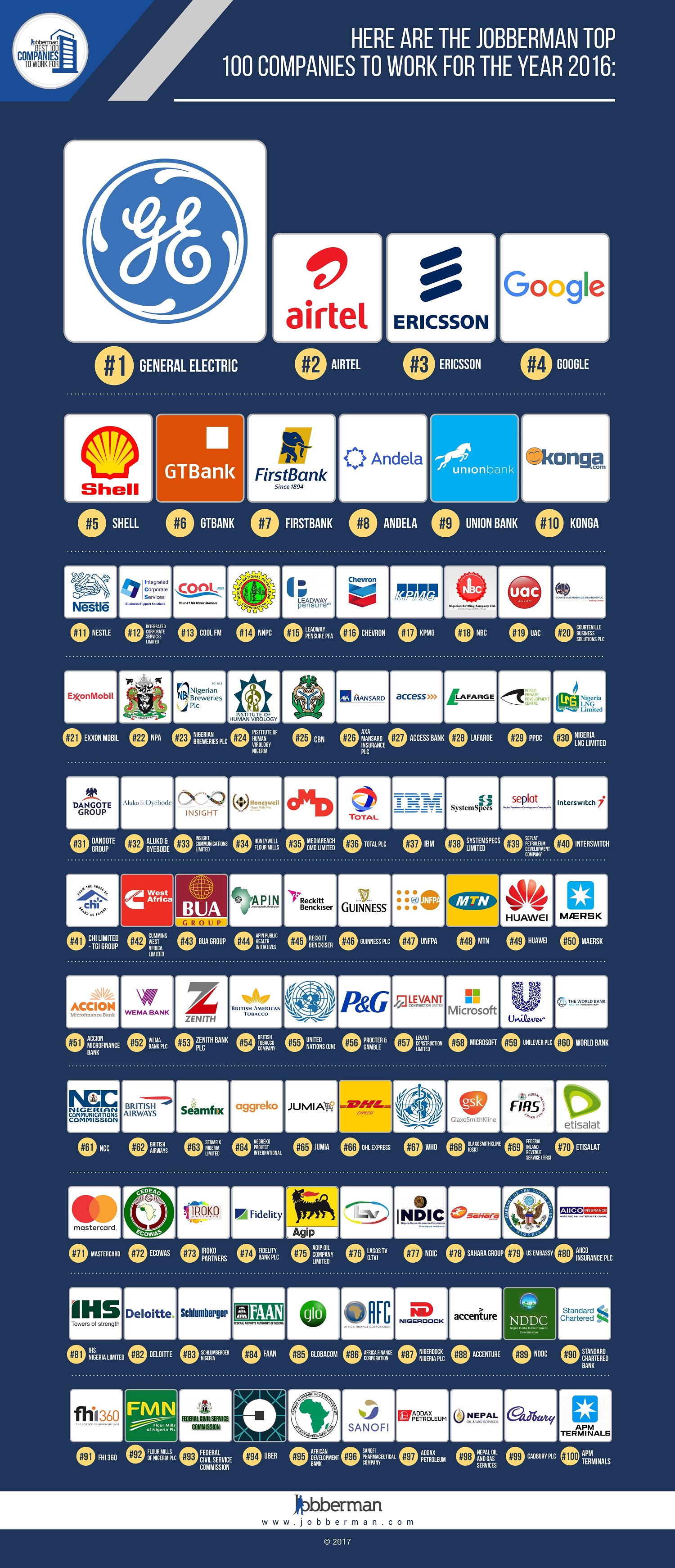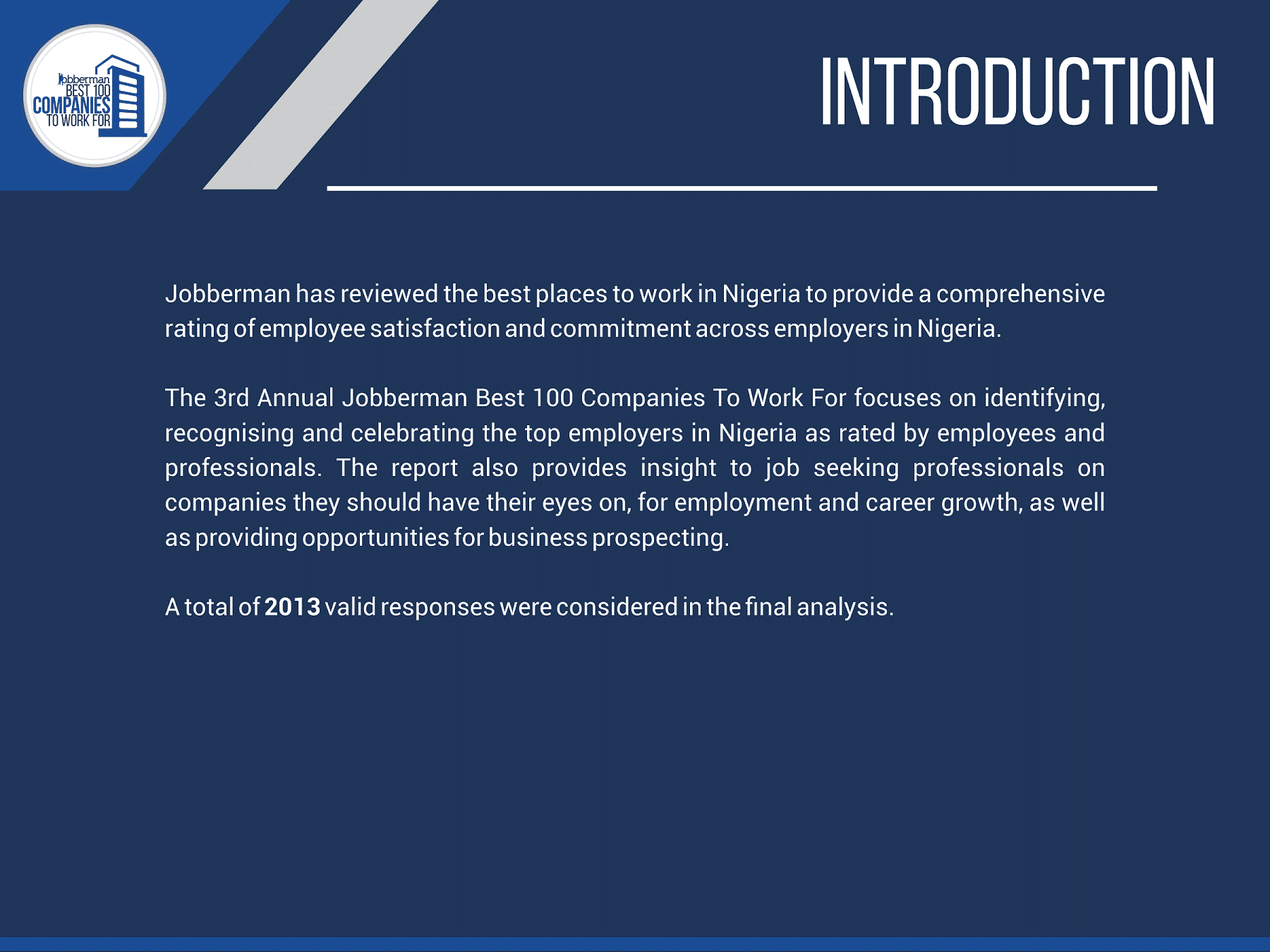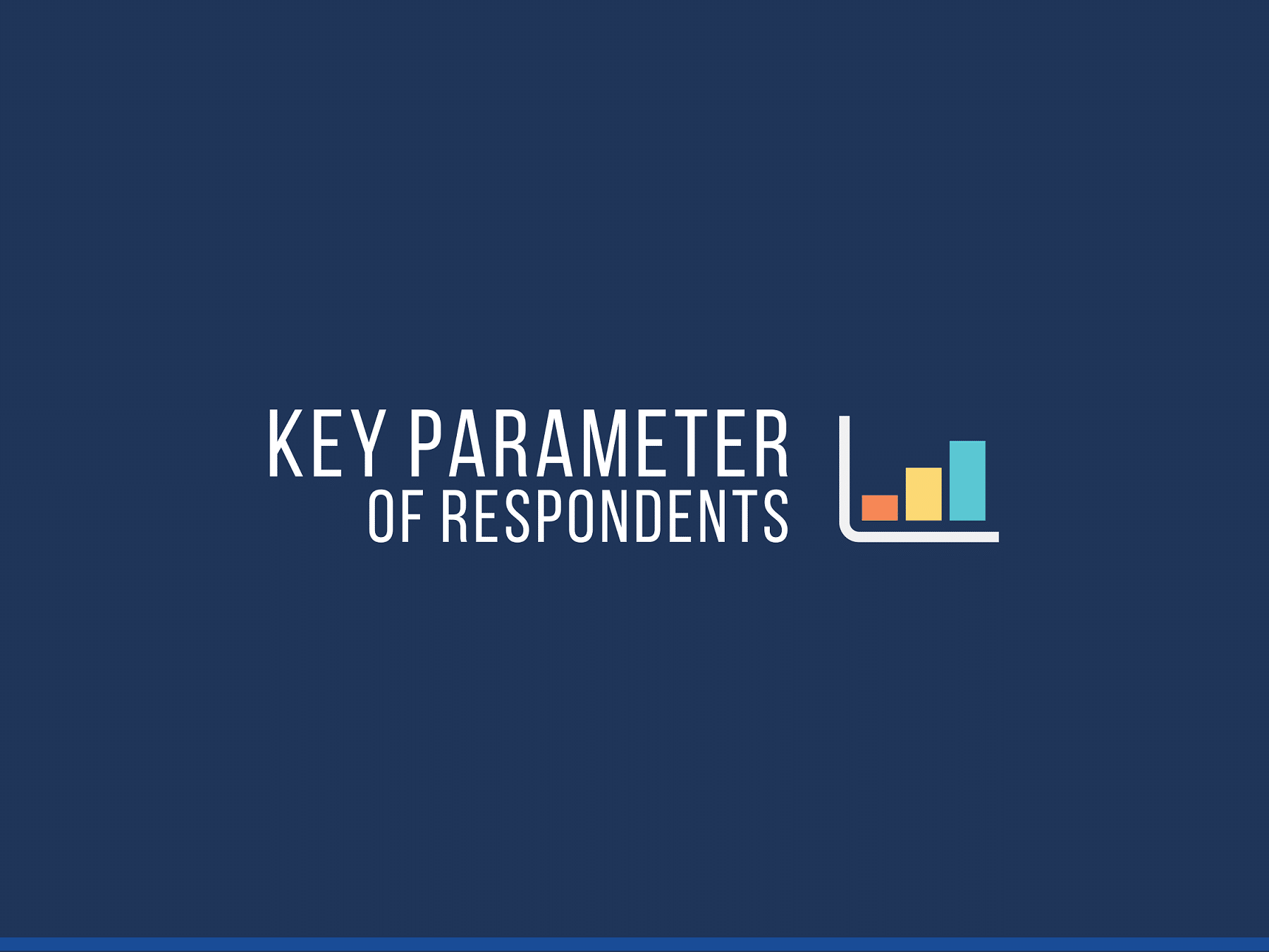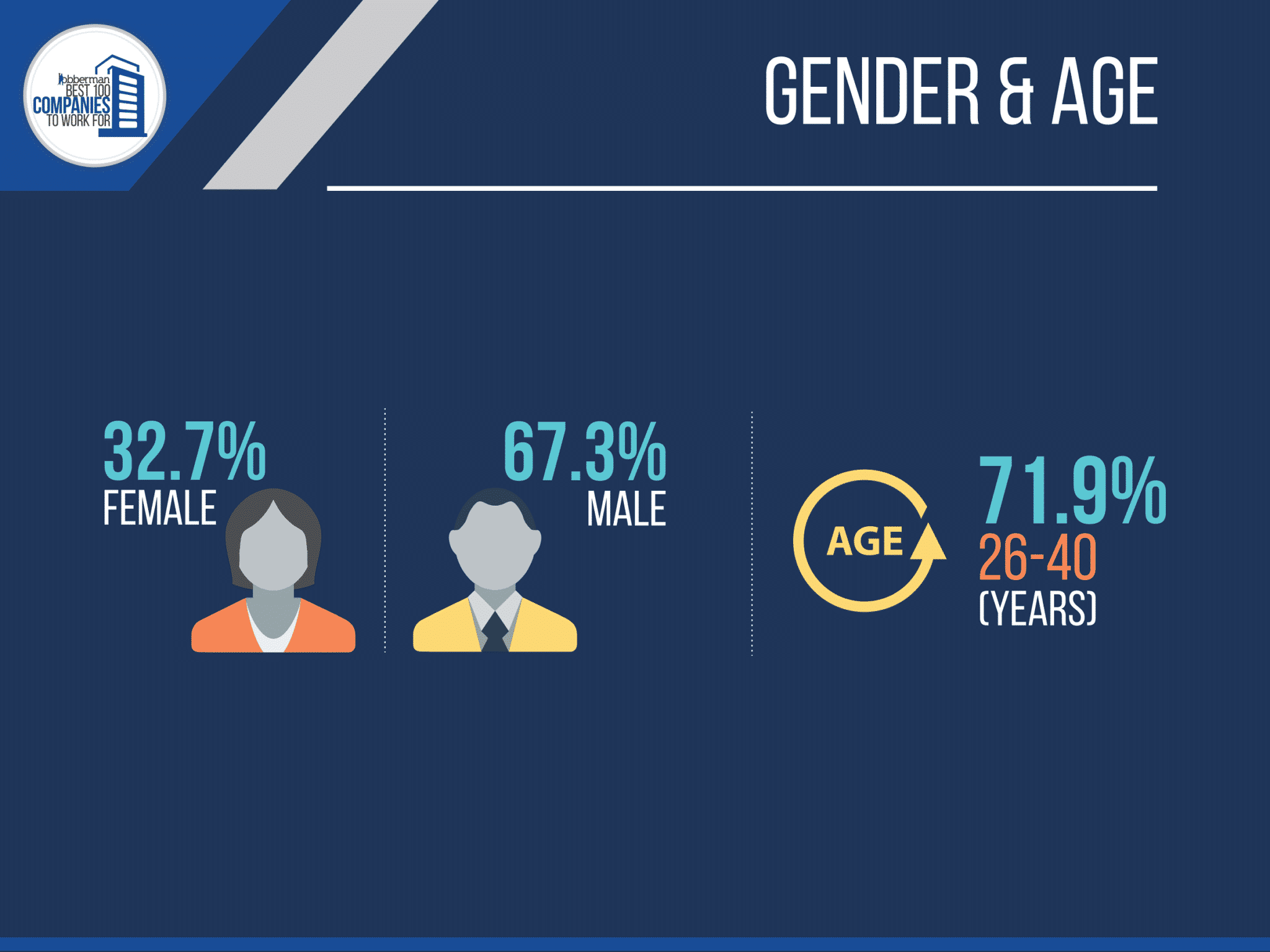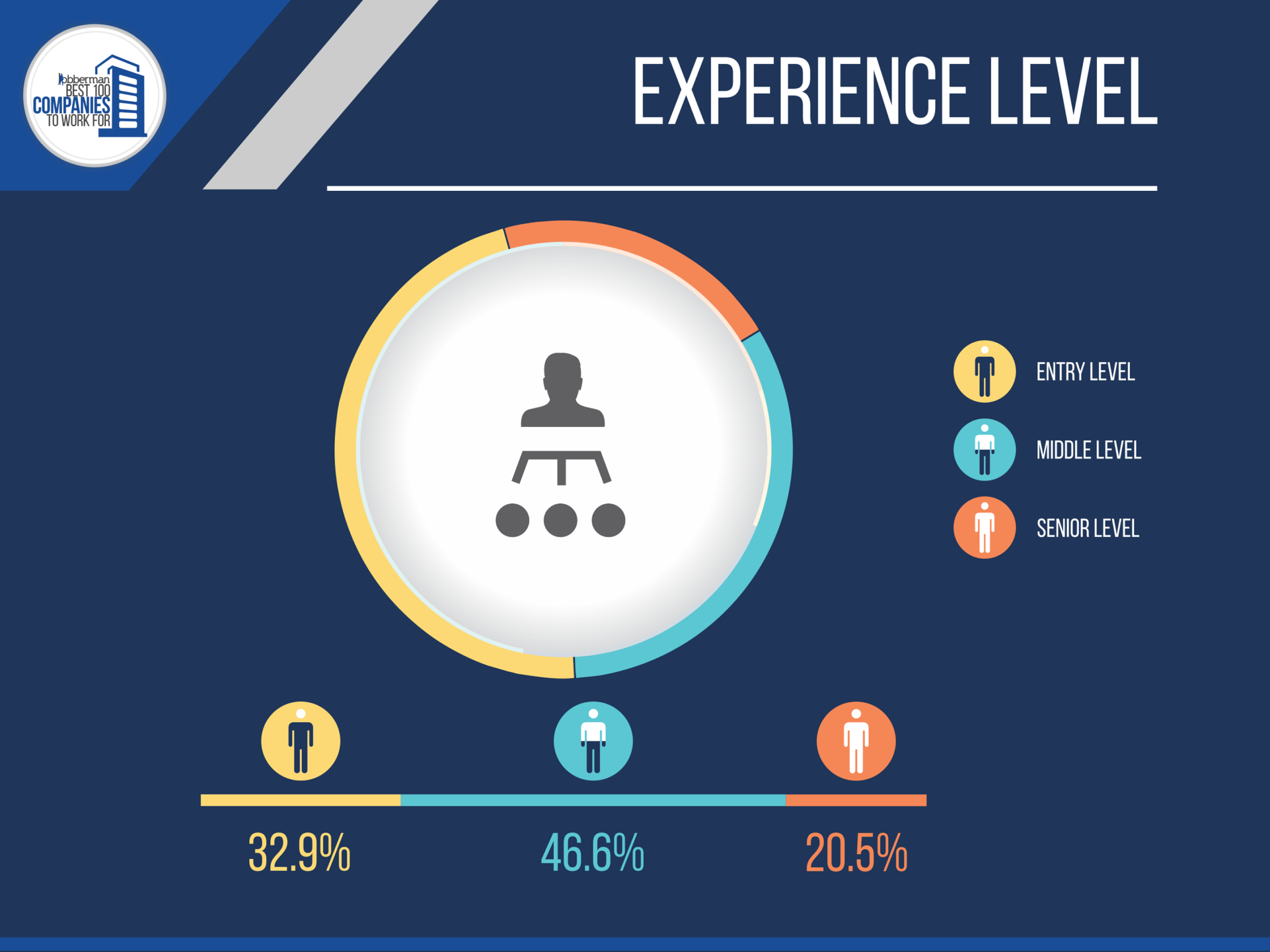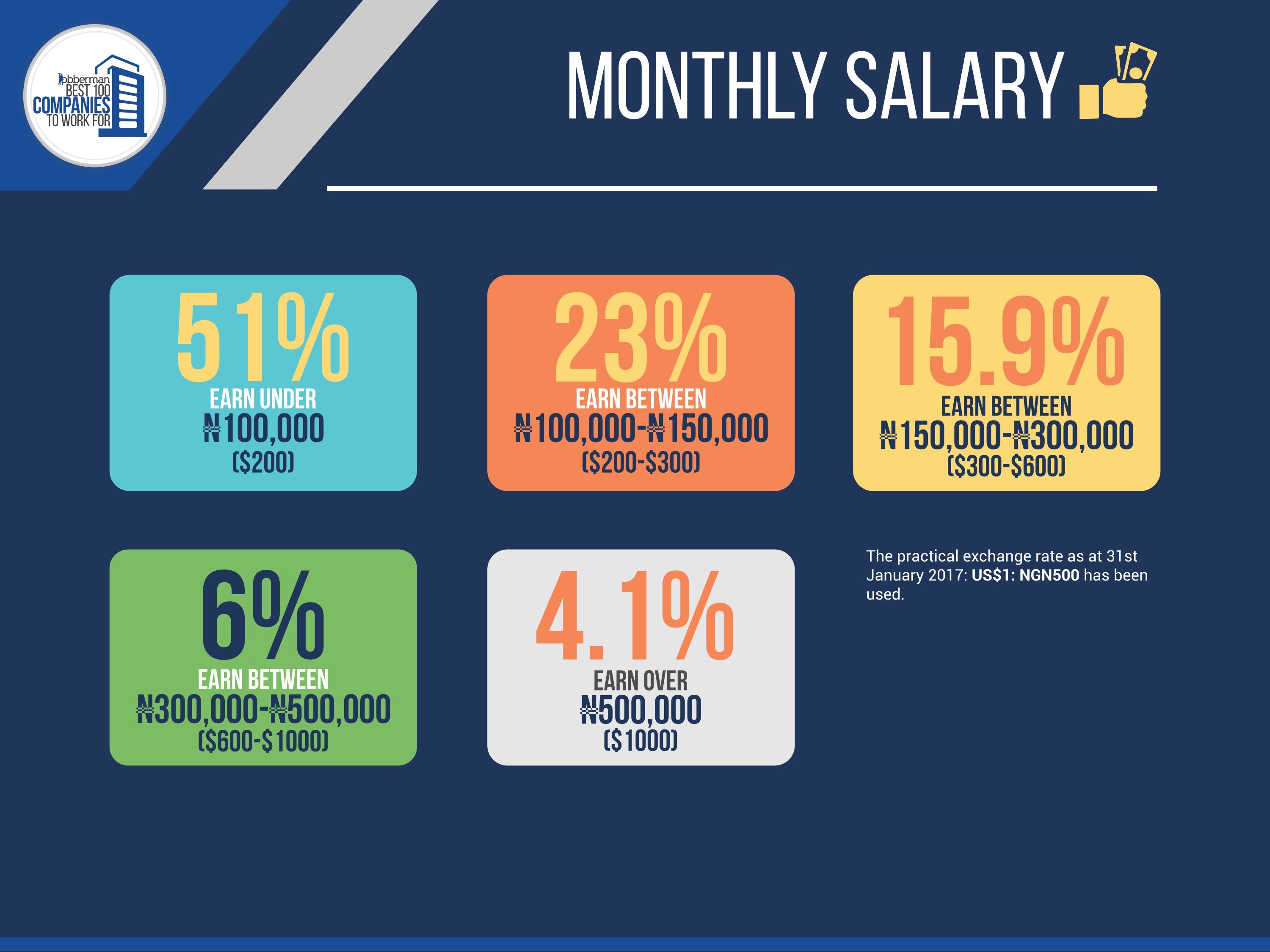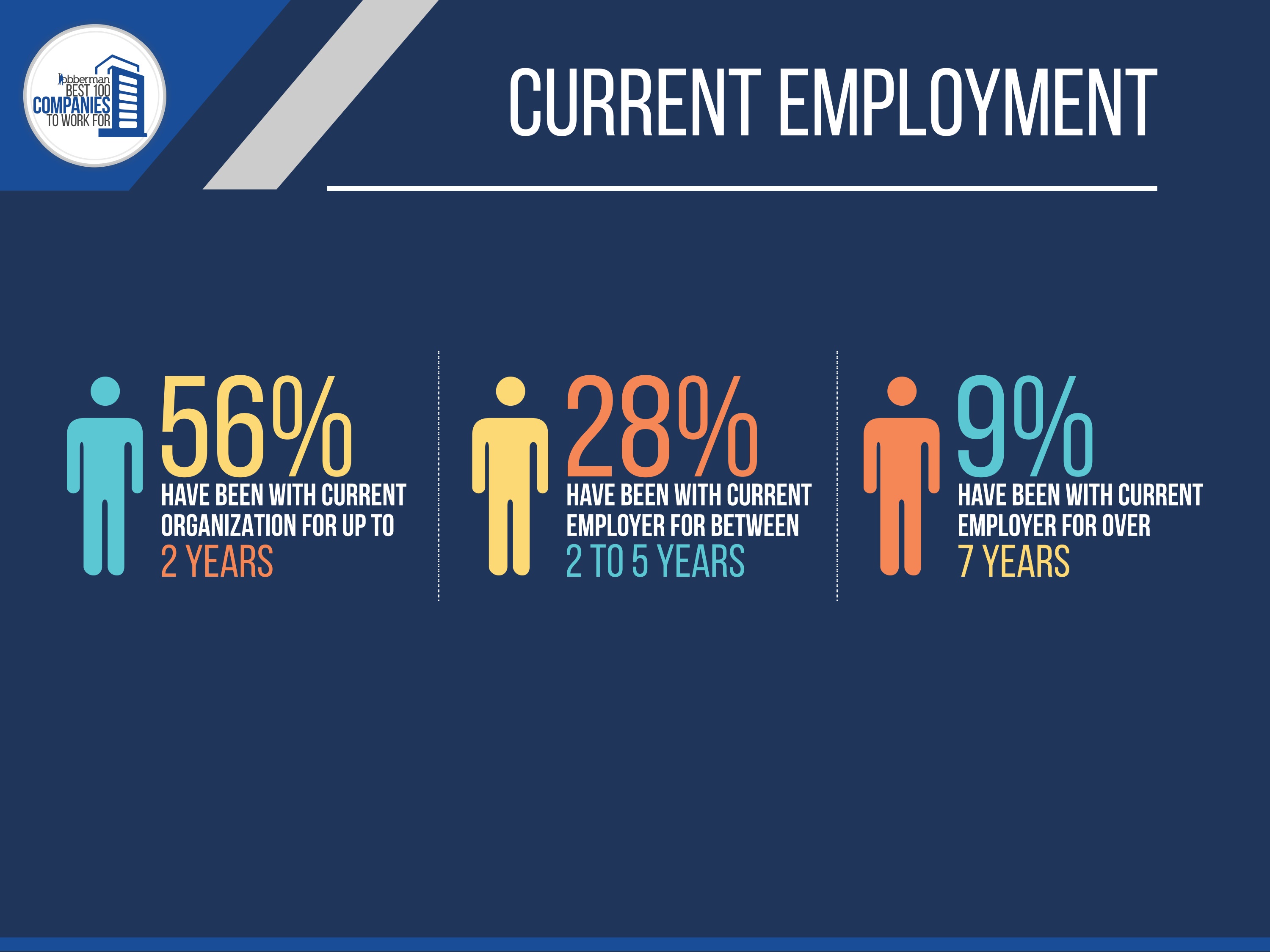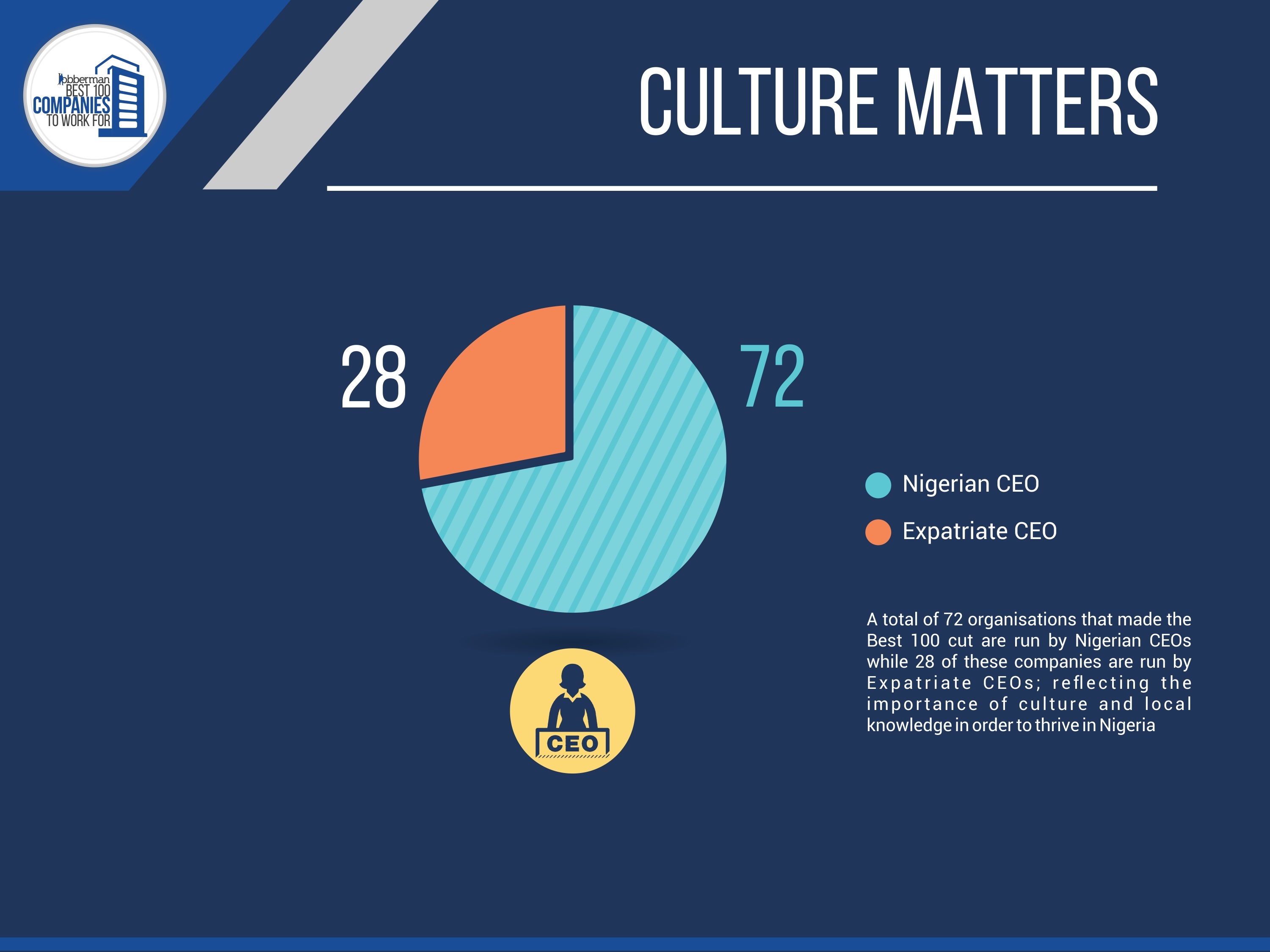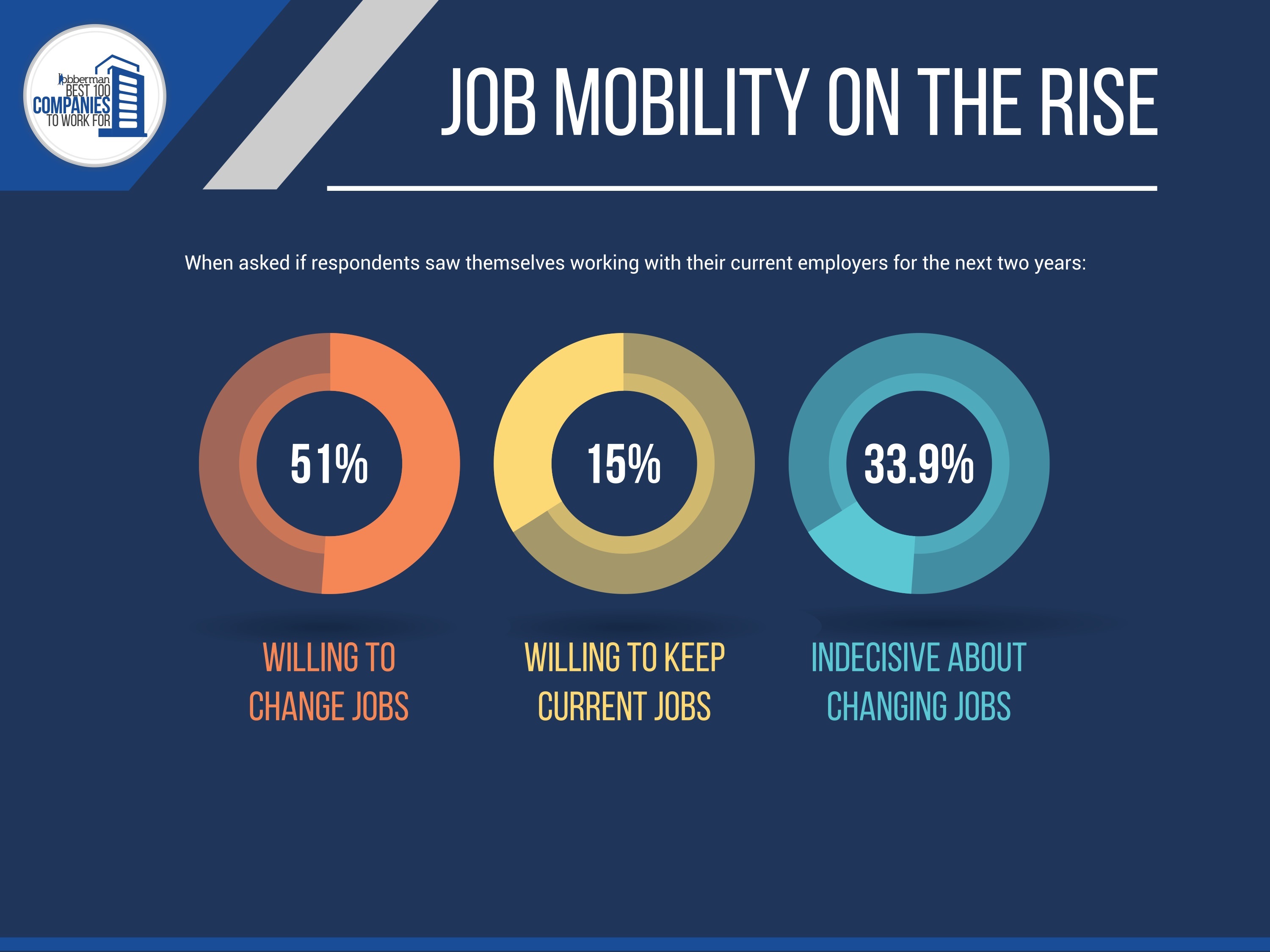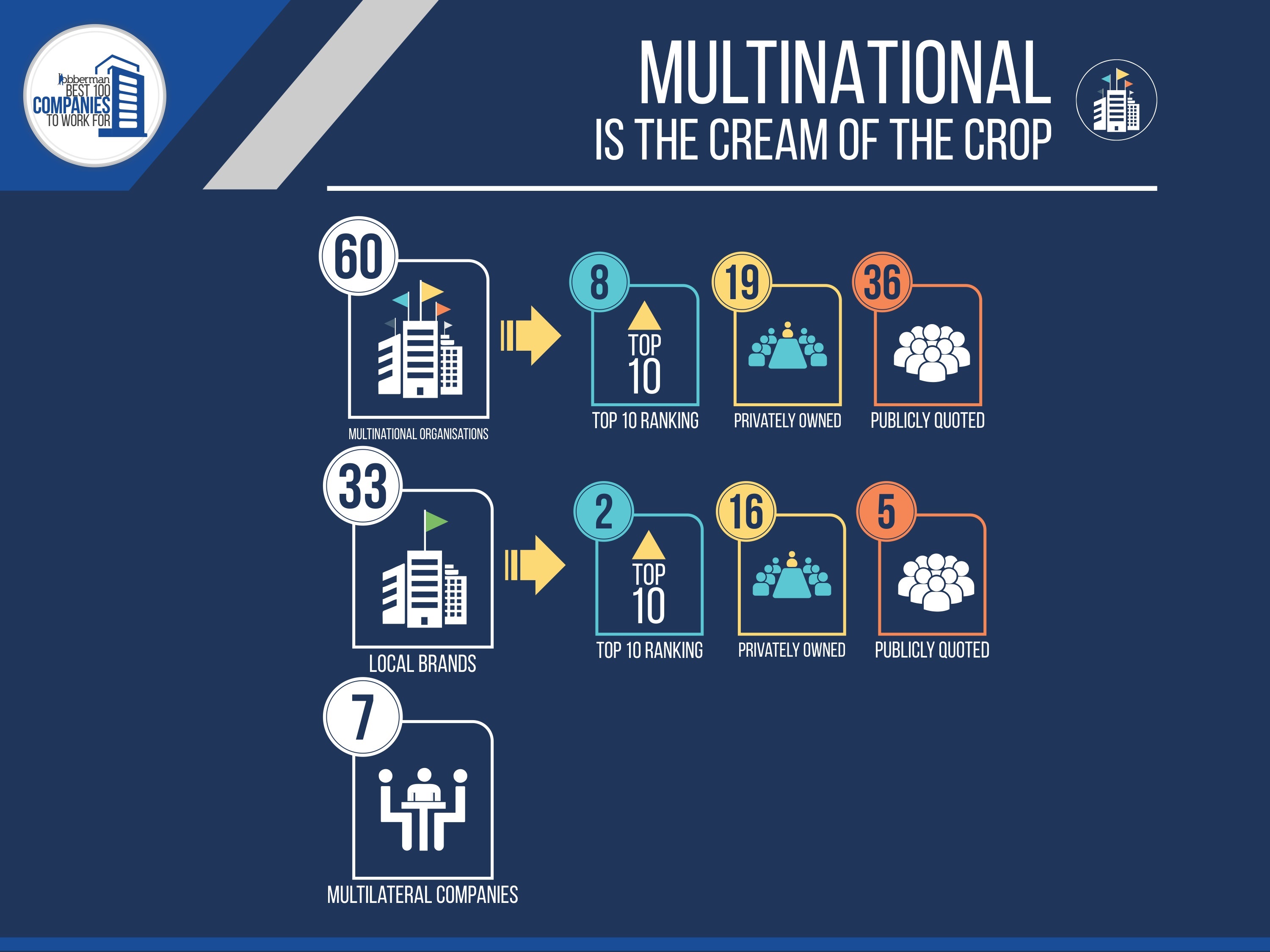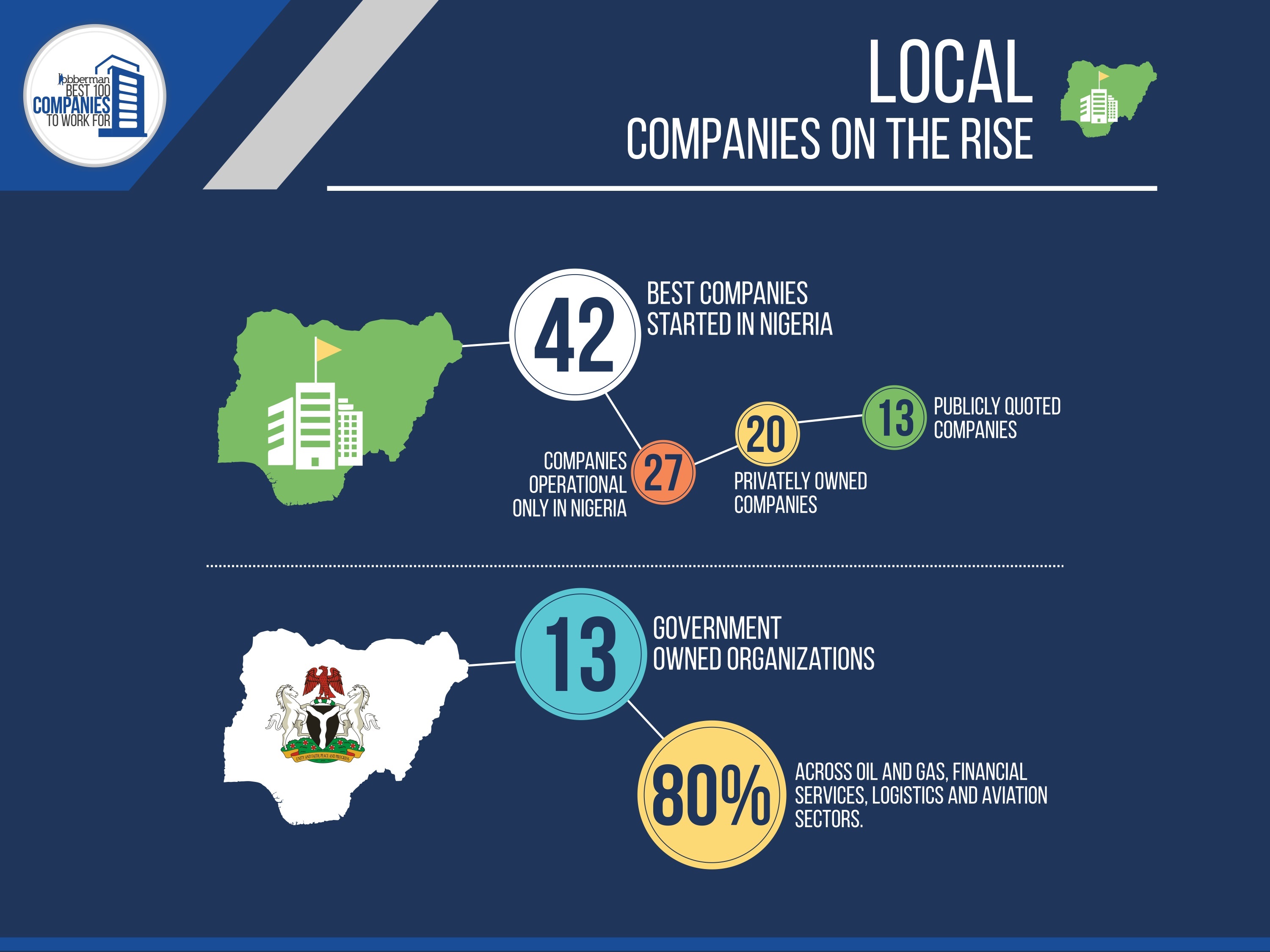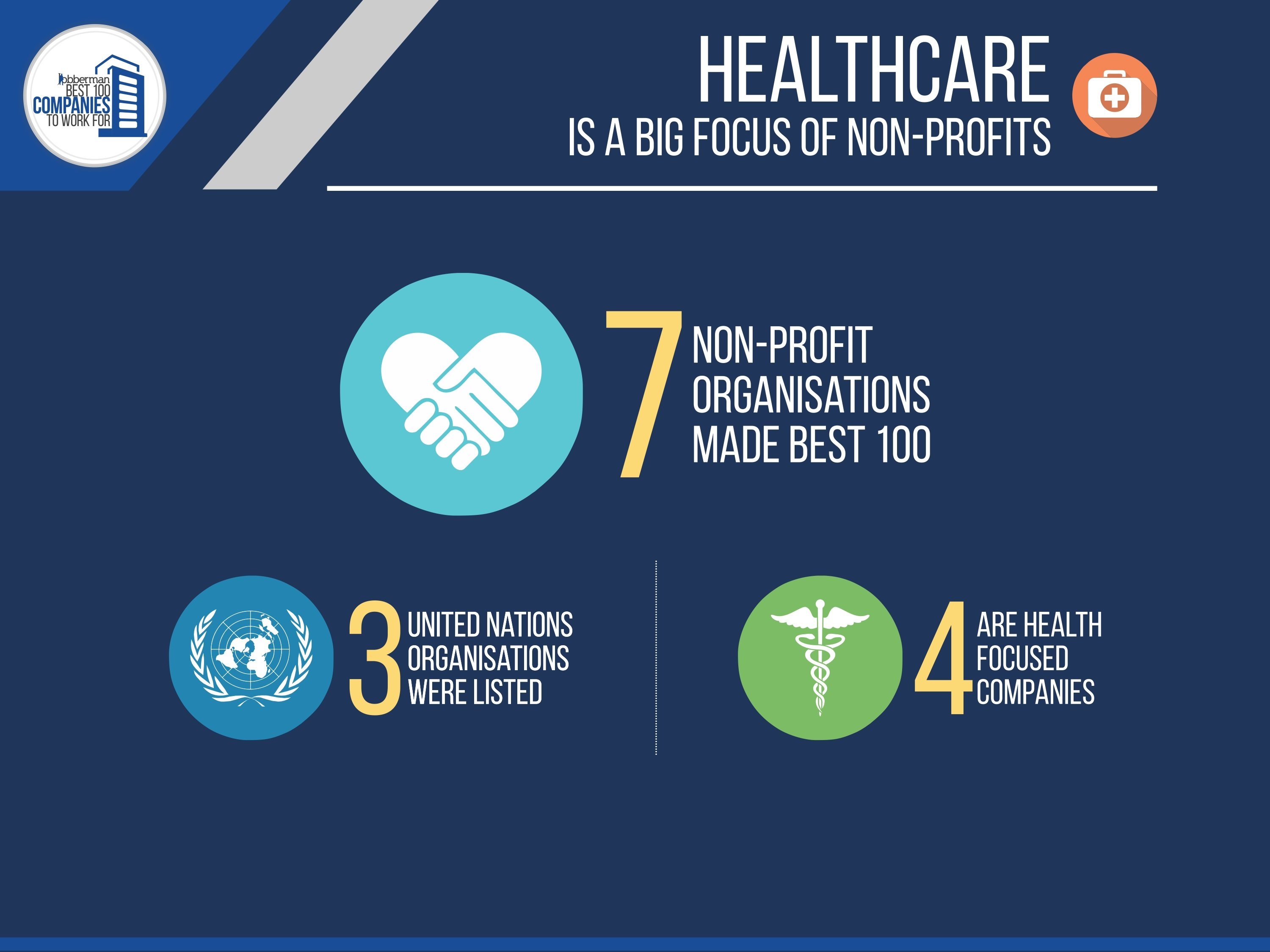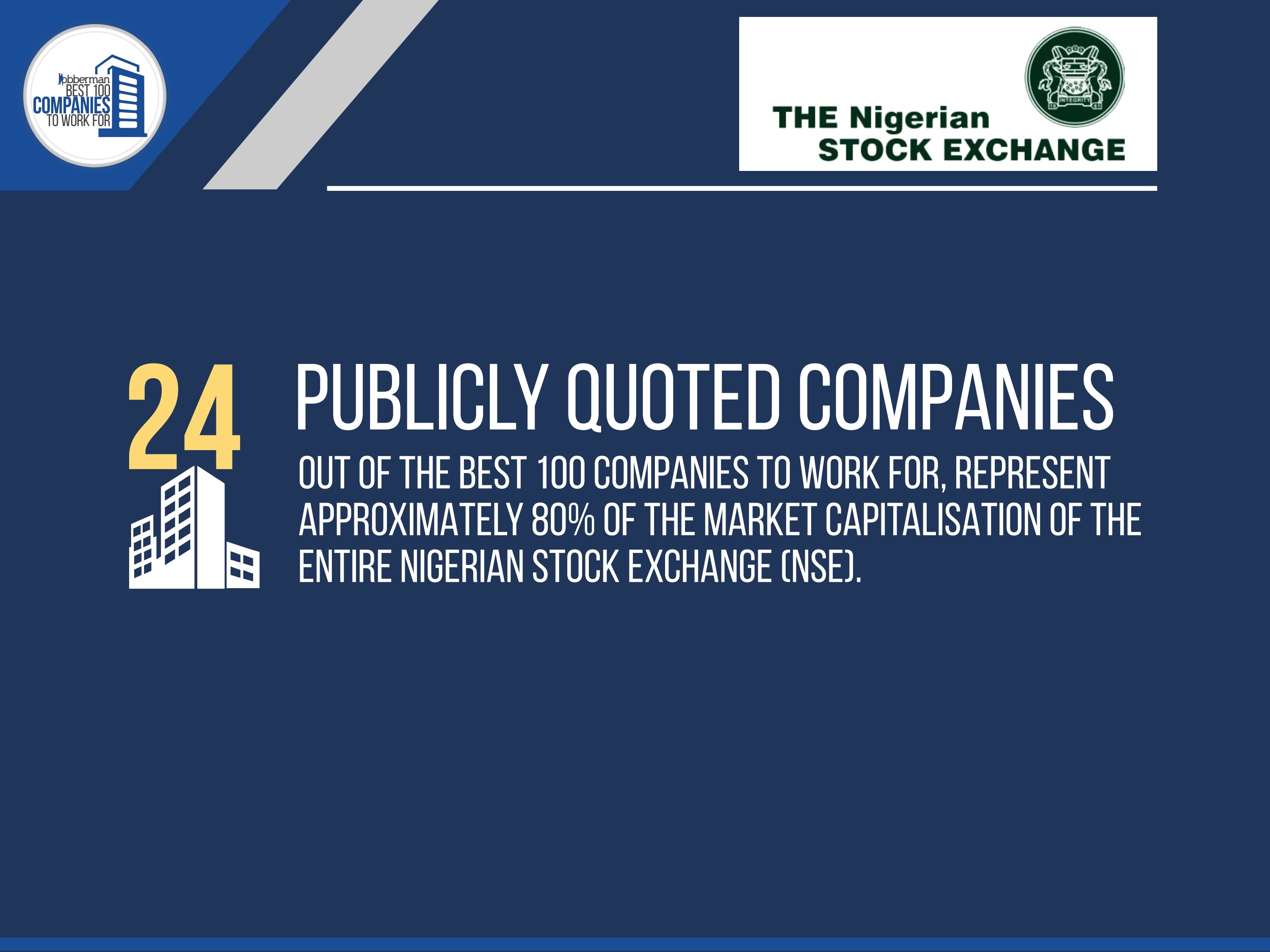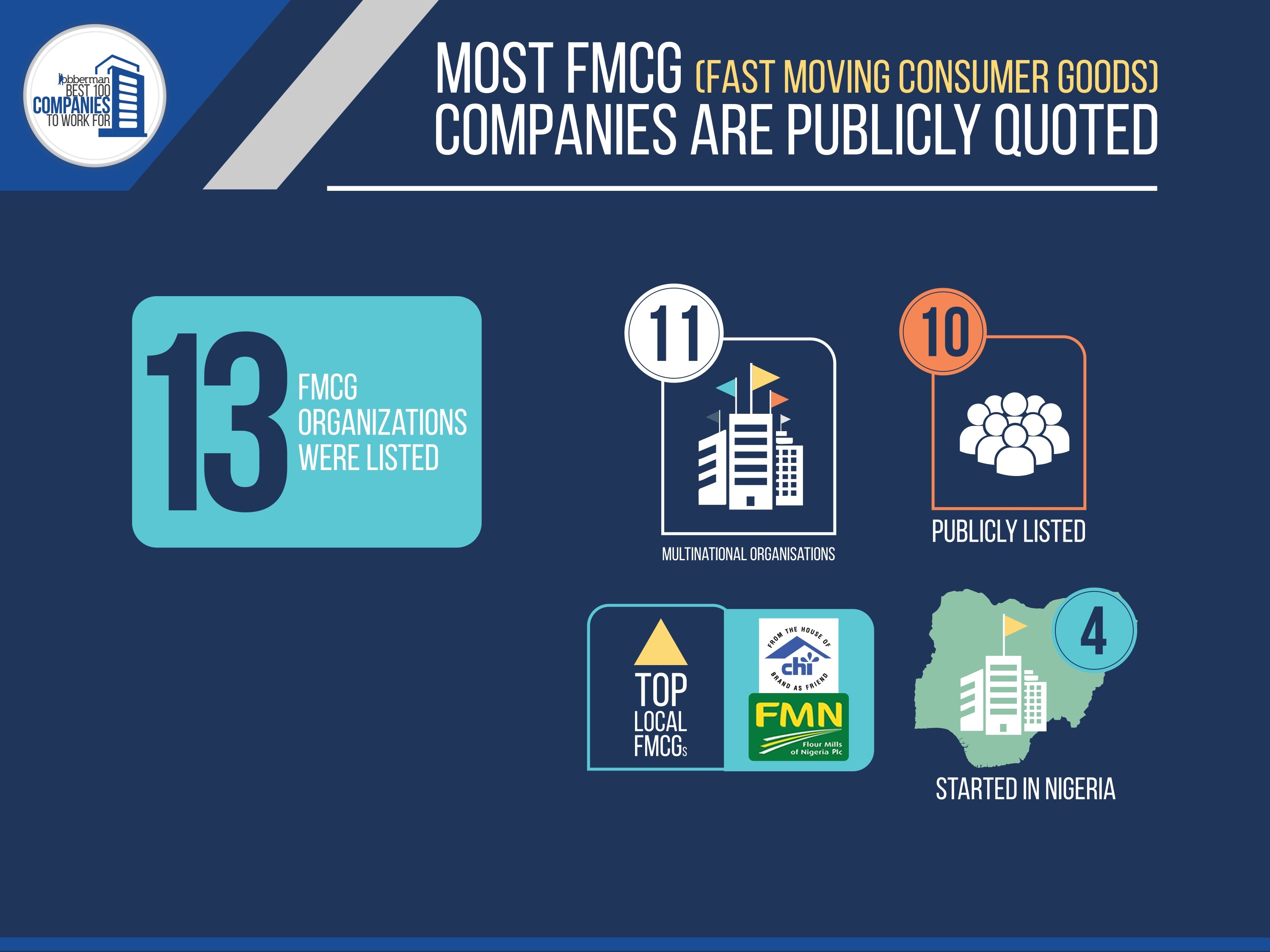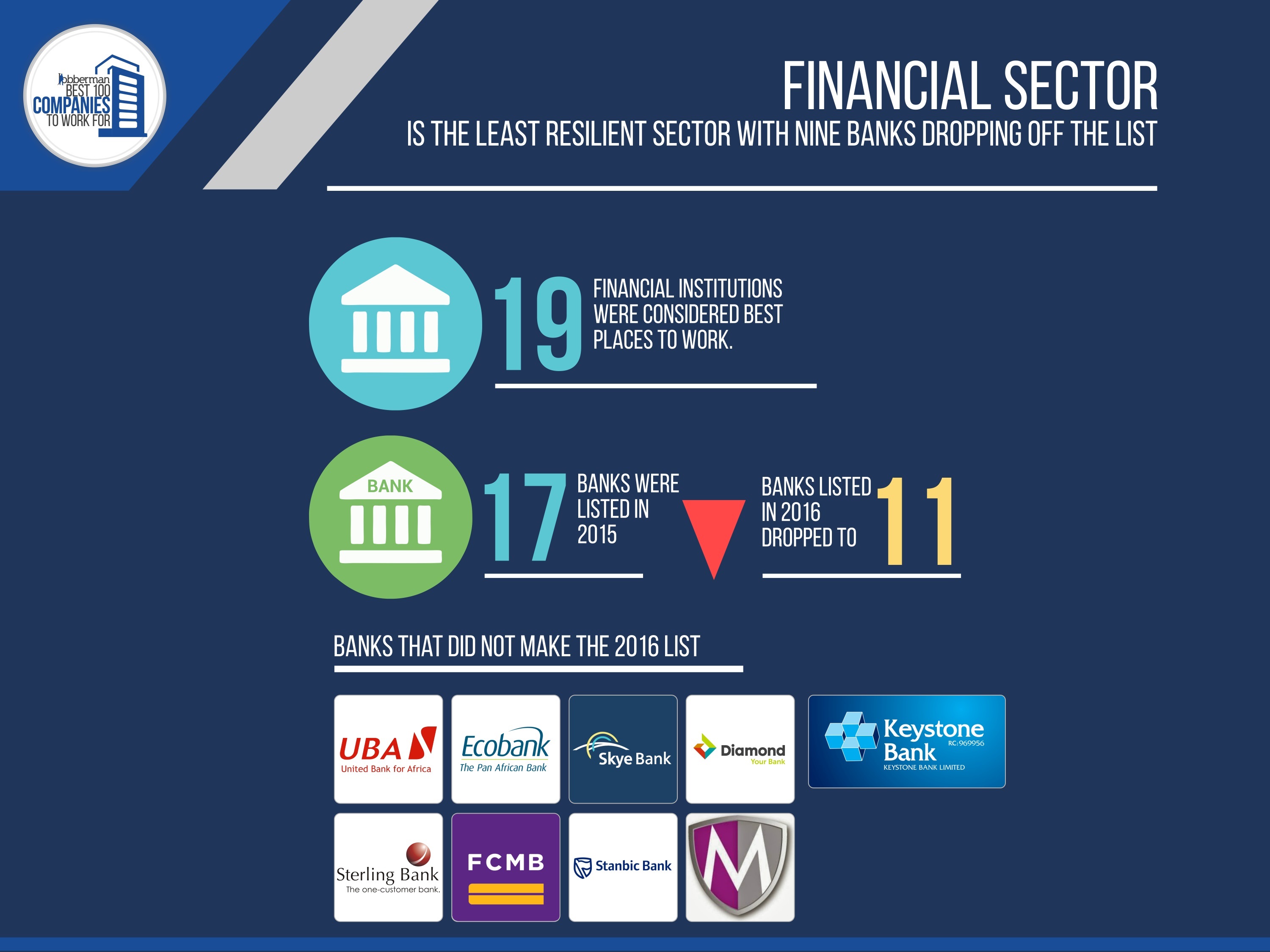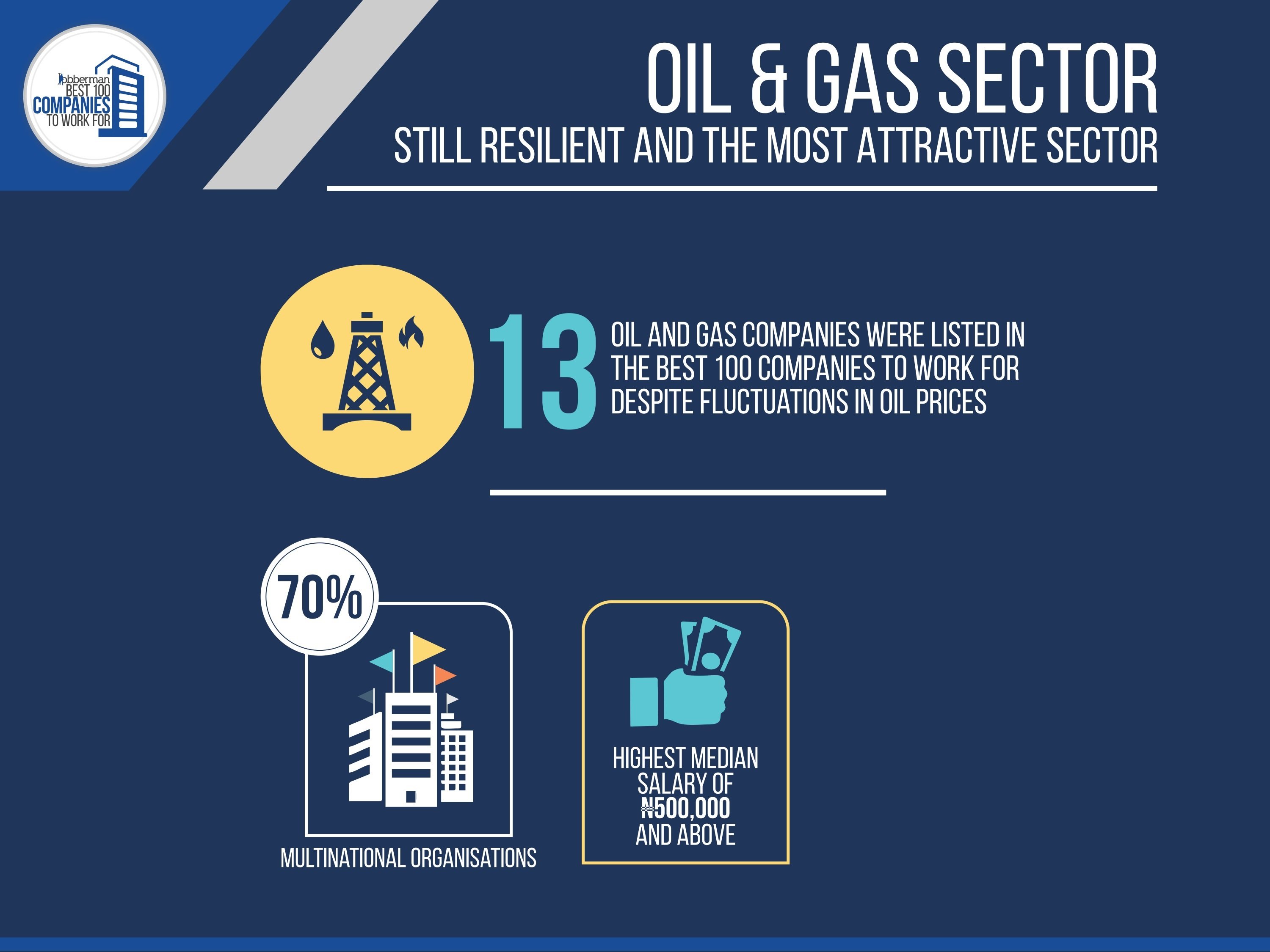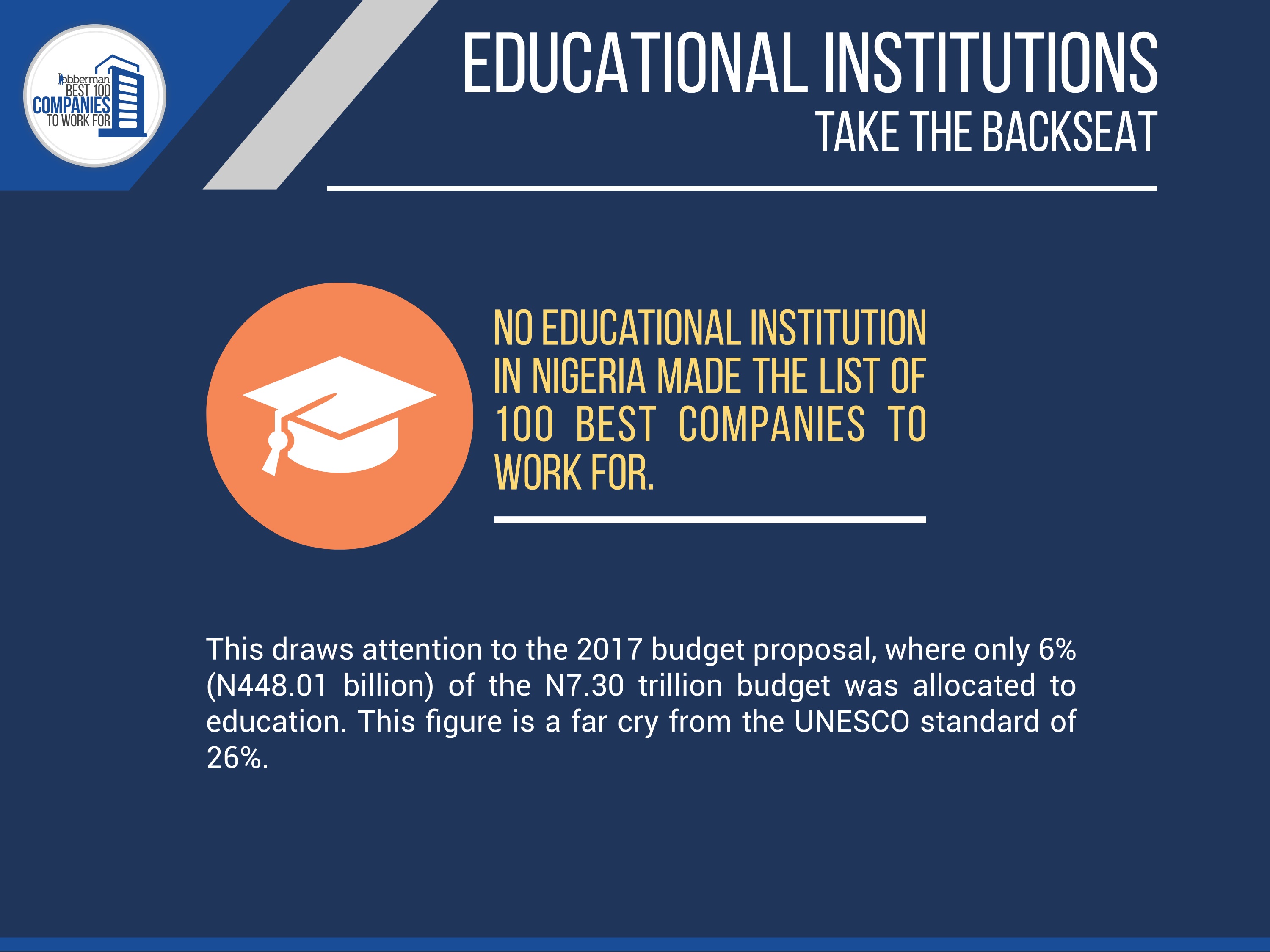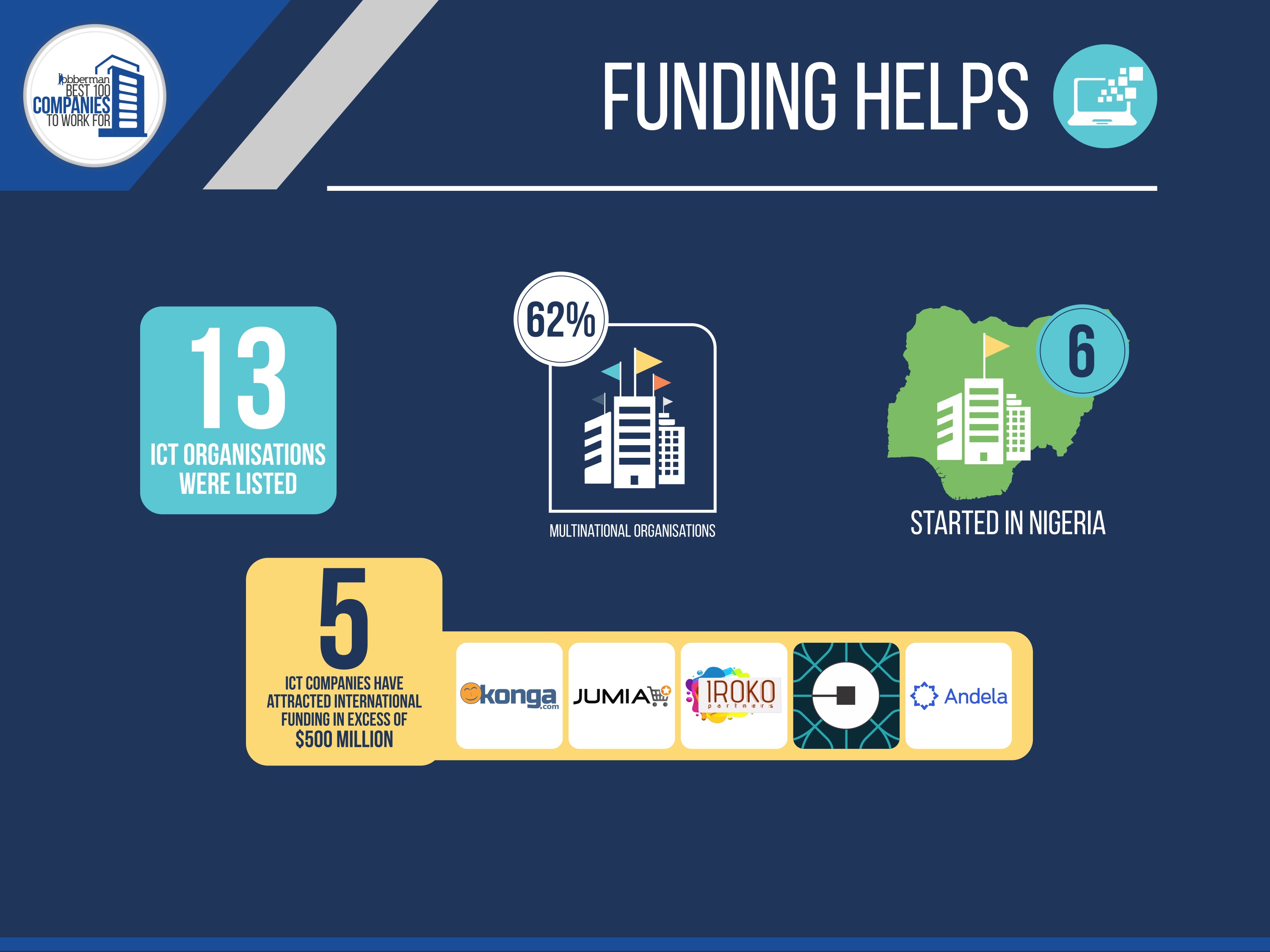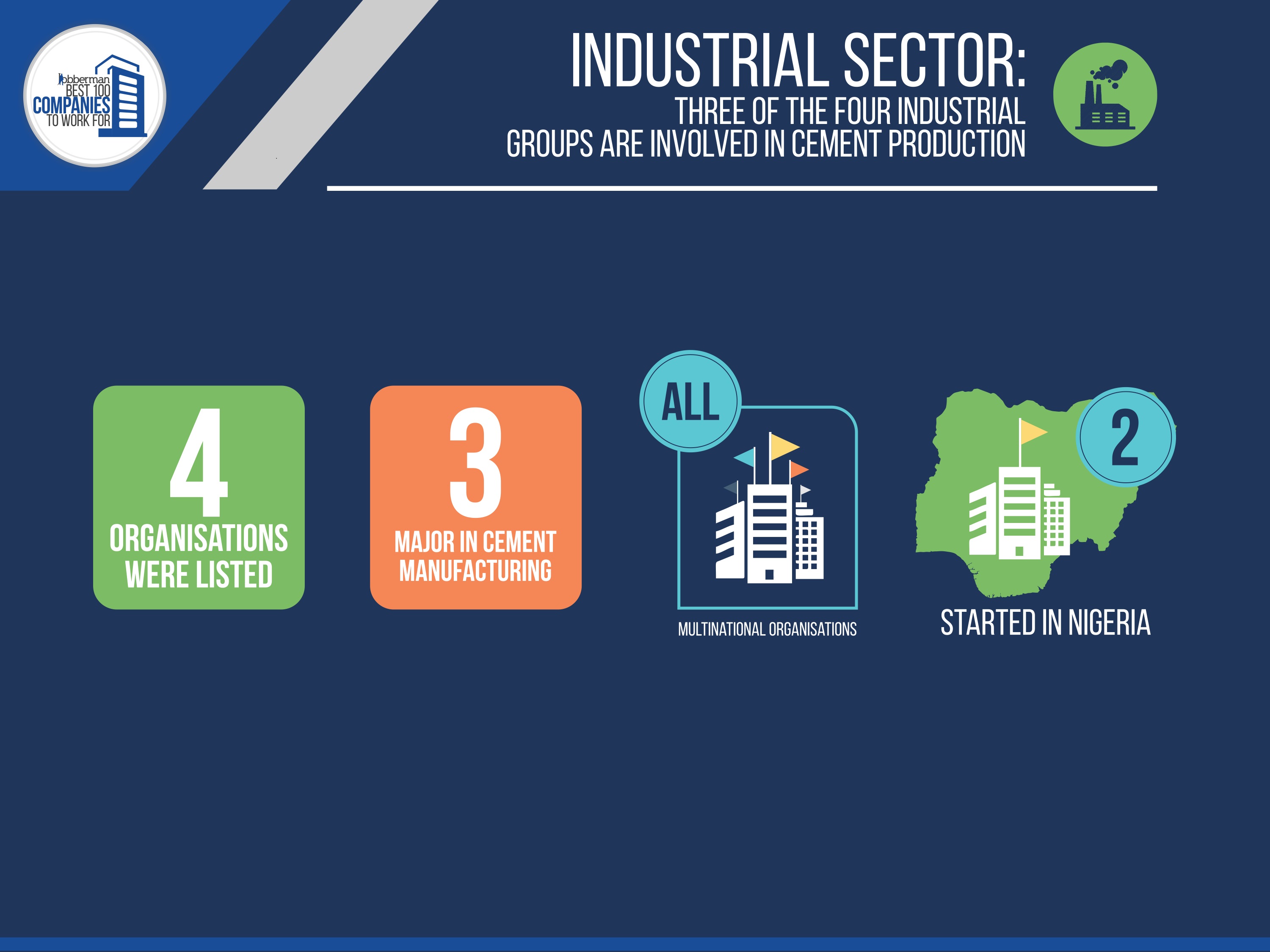Which organisations are the leading brands to work for?
Jobberman has reviewed the list of the best places to work in Nigeria to provide a comprehensive rating of employee satisfaction and commitment to different employers in Nigeria.
Below is an infographic of the 100 companies that made the 2016 list at a glance.
The 3rd Annual Jobberman Best 100 Companies To Work For focused on identifying, recognising and celebrating top employers in Nigeria, as rated by employees and professionals. The ranking also provides insight to job seekers on companies they should have their eyes on, for employment and career growth, as well as providing opportunities for business prospecting.
Jobberman.com conducted online surveys with experts across all industries utilising its 2 million+ database of entry-level job seekers and seasoned professionals; as well as reaching out through email, social media, and partner channels. The survey captured questions on work experience, salary parameters and working conditions.
The key work parameters highlighted in the survey were as follows:
- Gender
- Age
- Employment Status
- Level of Experience
- Monthly Salary
- Current Organisation of Employment
- Reasons for Commitment to Current Employer
- Job Satisfaction
- Career Growth Prospects
- Work-Life Balance
- Staff Welfare
- Equal Opportunity Policy
- Company Culture
Table of Contents
Methodology
Respondent Categorisation
Only responses from employed respondents were considered, on the premise that employed respondents are better qualified to provide accurate and unbiased views on their current or past organisations.
All respondents were classified according to Age Bracket, Seniority Level, Monthly Salary and duration at the company. Only seniority level had a weighting and impact in the final results with the senior level carrying the most weighting and entry-level carrying the least. The Business Owner level carried no weighting so as not to make the results biased.
Respondents were asked to rate their current employer on the following satisfaction metrics, using a 5-point system ranging from Not Satisfied to Very Satisfied:
- Job Security
- Monthly Salary
- Career Growth Prospects
- Company Management
- Work/Life Balance
- Staff Welfare
- Employee Relationship
- Gender Equality
- Organisational Structure
The responses here were weighted and used to qualify and rank all 172 nominations for the Top Employers to work for.
Nominations by current and former employees had a higher weighting than those who nominated companies based on hearsay or public perception. The final scores per company were then normalised to take account of companies who have thousands of employees. Only companies confirmed to have more than 50 employees were considered in the final result.
The major work parameters responsible for the satisfaction ratings indicated above were centred primarily on Monthly Salary, Work/Life Balance, Career Growth and Advancement, Welfare Benefits and Job Security in order of importance.
Respondent Overview
A total of 2,013 valid responses were considered in the final analysis.
- 32.7% female and 67.3% male.
- 71.9% of the respondents were between the ages of 26 and 40.
- Seniority parameters were as follows: Entry-Level 32.9%, Middle-Level 46.6%, Senior-Level 17.7% and Business Owners 2.8%.
- 51% of respondents earn under NGN100,000 (US$200) monthly, 23% of respondents earn between $200 and $300, 15.9% earn between $300 and $600, 6% earn between $600 and $1000 with only 4.1 % of respondents earning over $1000 monthly.
(The exchange rate as at 31st January 2017 of US$1: NGN500 has been used.) - About 56% of respondents have been working for their current organisations for up to 2 years. 28% of them have been with their current employer for between 2 and 5 years while 9% had been with their current employer for over 7 years.
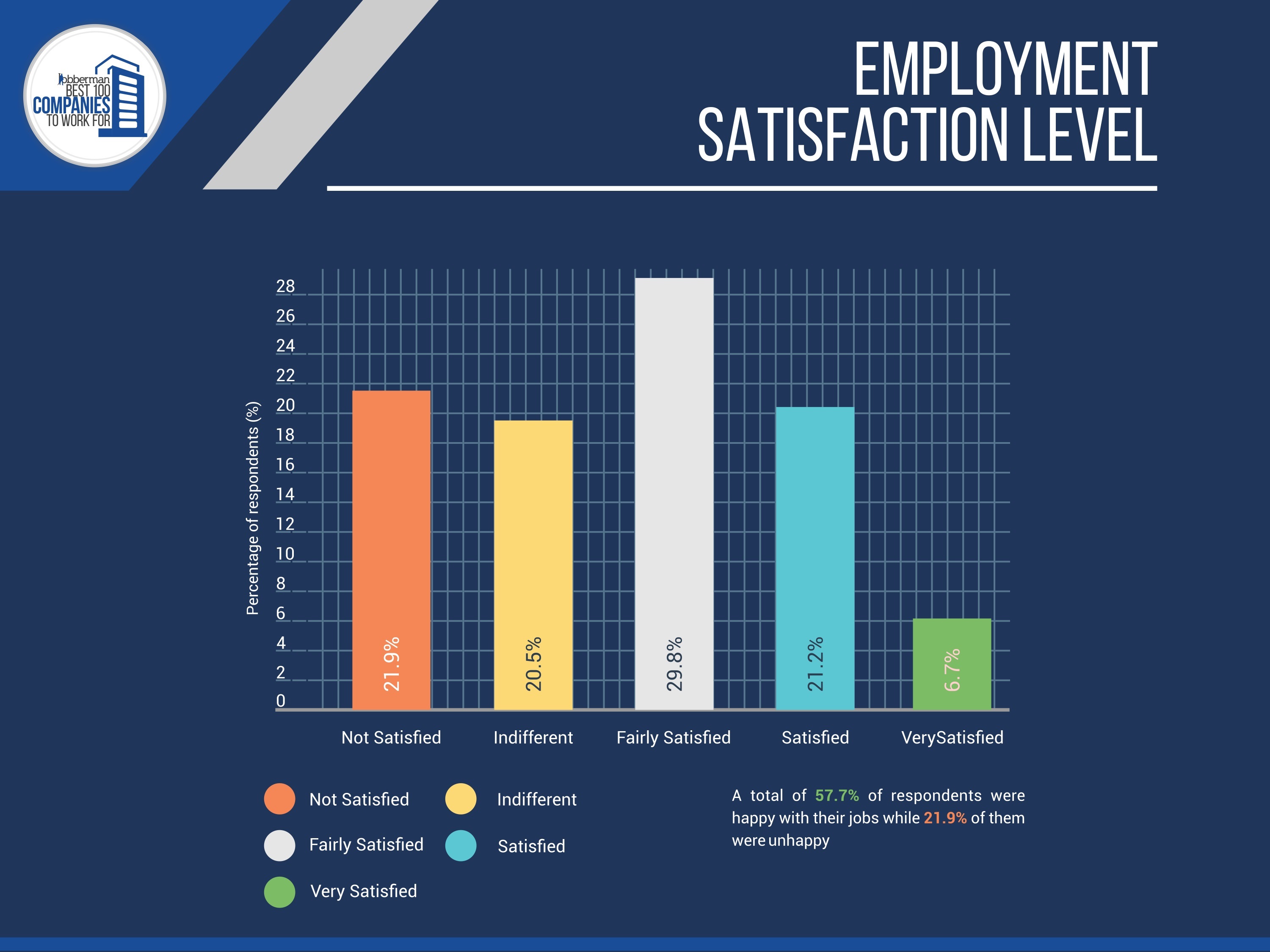
The majority of survey respondents indicated being fairly satisfied with their current employment while 21.9% expressed dissatisfaction overall. Only 6% of the respondents indicated they were very satisfied overall while 21.2% were just satisfied.
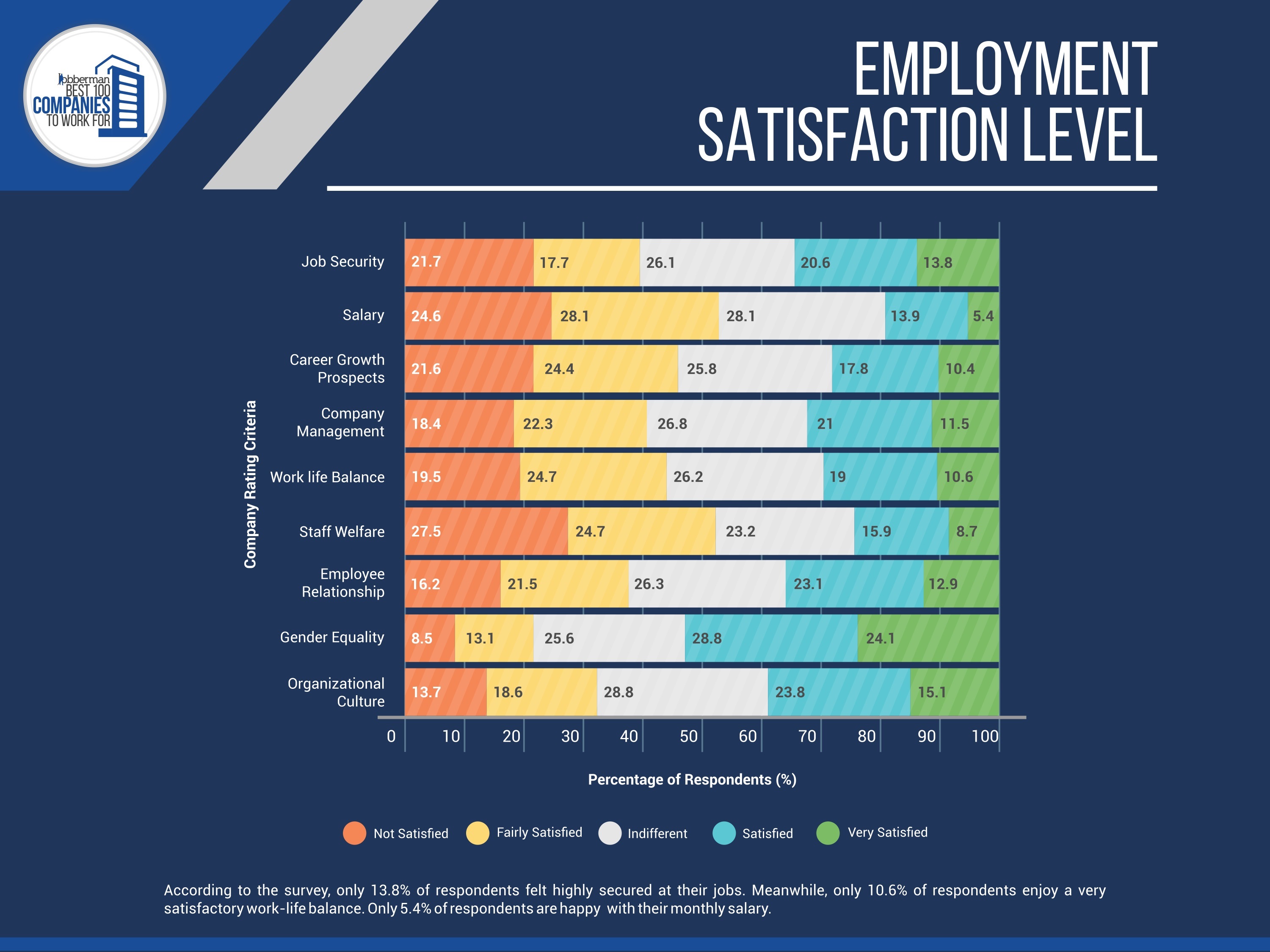
According to the survey, only 13.8% of respondents were highly satisfied with their jobs. This did not come as a surprise judging from the fact that only 10.6% of respondents enjoy a very satisfactory work-life balance. Another source of the dissatisfaction expressed by respondents was credited to only 5.4% of them being satisfied with their monthly salary. The frustration experienced by employees can also be attributed to poor career growth prospects, where only 17.8% of respondents were satisfied. To highlight the dissatisfaction even further, only 15.1% considered their employer’s organisational culture to be excellent. One highlight that also raised great concerns was staff welfare where only 8.7% of the respondents considered their company’s staff welfare excellent.
These figures clearly reveal a need for companies to improve on job satisfaction for their employees with a focus on better salaries, improved staff welfare packages, a more robust work-life balance, a stronger organisational culture and enhanced career growth prospects for employees.
Insights
Culture matters
A total of 72 organisations that made the Best 100 cut are run by Nigerian CEOs while 28 of these companies are run by Expatriate CEOs; reflecting the importance of culture and local knowledge in order to thrive in Nigeria.
59.3% of respondents were of the opinion that their work commitments were appreciated by their organisations. Another 63% were open to referring their company to others seeking employment.
Job Mobility on the Rise
When asked if respondents saw themselves working with their current employers for the next two years, 51% did not, while 15% responded that they would, 33.9% of the respondents were unsure.
Multinationals are the cream of the crop
A total of 60 multinational organisations made the cut for best companies to work for in Nigeria. 8 of these organisations rank in the top 10 companies on the list, followed by 2 local brands in the financial and e-commerce sectors, respectively. Of these multinational companies, 19 of them are privately run while 36 are publicly listed companies.
Local companies on the rise
The rankings show that 42 of the best companies listed started in Nigeria and cut across the Financial Services, ICT, Media, Power, Oil and Gas, Aviation, Outsourcing and Professional Services sectors. In total, 27 local companies were listed with 20 of these organisations being privately owned while 13 of these organisations are publicly listed companies.
Government-owned organisations totalled 13 of the Best 100 with 80% of them being in the Oil and Gas; Financial Services; Logistics; and Aviation Sectors.
Healthcare is a big focus for Non-Profit Organisations
7 Non-Profit organisations were listed as the best places to work. 3 out of these 7 organisations are United Nations’ (UN) organisations while 4 of them are health-care focused.
24 of the companies dominated the Nigerian Stock Exchange (NSE)
With ‘Power Law’ at play in 2016, a total of 39 companies out of the 100, represent approximately 80% of the market capitalisation of the entire Nigerian Stock Exchange (NSE).
Most FMCG’s on the list are Publicly Quoted
In the FMCG sector, 13 organisations were ranked as best to work for. It was interesting to know that 10 of these organisations are all publicly quoted companies. 11 of these organisations are multinational companies with CHI Limited and Flour Mills ranking top for the local brands. Only 4 FMCGs listed started in Nigeria.
Financial Sector is the least resilient sector with nine banks dropping off the list
Amidst the heavy job cuts across financial services sector in 2016, a total of 19 financial institutions were considered best places to work. 8 of these being multinationals. In 2015, a total of 17 banks made it to the list of best companies to work for. In 2016, the number of banks on the list dropped to 10; with Skye Bank, UBA, FCMB, Stanbic IBTC Bank, Sterling Bank, Diamond Bank, EcoBank, Mainstreet Bank and Keystone Bank not making the list.
Oil & Gas still resilient and the most attractive sector
Despite the decline in oil prices, 13 Oil and Gas companies were listed on the Best 100 Companies to Work For; with 70% being multinational companies and NNPC ranking highest for the local brands.This was an improvement from our last report with only 8 oil and gas organisations making the best 100 cut. The Oil and Gas sector also emerged as the industry with the highest-paid median. It recorded the best compensation and benefits with NGN500,000 as monthly salary for entry-level employees.
Educational institutions take the backseat
No educational institution in Nigeria made it to the list of 100 Best Companies to Work For. This draws attention to the 2017 budget proposal, where only 6 percent (N448.01 billion) of the N7.30 trillion budget was allocated to education. This figure is a far cry from the UNESCO standard of 26%.
Funding helps
In the ICT sector, 13 organisations were listed with over 62% of these companies being multinational and 6 of them founded in Nigeria. 5 internet companies: Konga, Jumia, Iroko Partners, Uber and Andela are internationally funded companies that have attracted an excess of US$500 million. Among the 7 Telecommunication brands that made the list of Jobberman Best 100 Companies to Work For, 85.7% of them were multinational organisations including locally founded establishments. Interestingly, only 2 out of the 7 companies were founded in Nigeria. These were Nigerian Communications Commission and Glo.
Three of the Four Industrial Groups are involved in Cement Production
In the industrial sector, 4 organisations were considered the best place to work. All of which are multinationals. 2 of these companies started in Nigeria. 3 out of 4 of the listed companies are pursuing cement manufacturing as a major line of business.
Here are the Jobberman Top 100 Companies to Work for the Year 2016:
- General Electric
- Airtel
- Ericsson
- Shell
- Guaranty Trust bank
- First Bank
- Andela
- Union Bank of Nigeria
- Konga
- Nestle Nigeria PLC
- Integrated Corporate Services Limited (ICSL)
- Cool FM Lagos
- Nigerian National Petroleum Corporation (NNPC)
- Leadway Pensure PFA Limited
- Chevron
- KPMG
- Nigerian Bottling company Limited
- UAC PLC
- Courteville Business Solutions PLC
- Exxon Mobil PLC
- Nigerian Port Authority (NPA)
- Nigerian Breweries PLC
- Institute of Human Virology Nigeria
- Central Bank of Nigeria
- AXA Mansard Insurance PLC
- Access Bank PLC
- Lafarge Cement WAPCO PLC
- Public and Private Development Centre Limited (PPDC)
- Nigeria LNG Limited
- Dangote Group
- Aluko & Oyebode
- Insight Communications Limited
- Honeywell Flour Mills PLC
- MediaReach OMD Limited
- Total PLC
- IBM
- SystemSpecs Limited
- Seplat Petroleum Development Company PLC
- Interswitch
- CHI Limited – TGI Group
- Cummins West Africa Limited
- BUA Group
- APIN Public Health Initiatives
- Reckitt Benckiser
- Guinness PLC
- UNFPA
- MTN
- Huawei
- Maersk
- Accion Microfinance Bank
- Wema Bank PLC
- Zenith Bank PLC
- British Tobacco Company
- United Nations (UN)
- Procter & Gamble
- Levant Construction Limited
- Microsoft
- Unilever PLC
- World Bank
- Nigerian Communications Commission (NCC)
- British Airways
- Seamfix Nigeria Limited
- Aggreko Project International
- Jumia
- DHL Express
- World Health Organisation (WHO)
- GlaxoSmithKline (GSK)
- Federal Inland Revenue Service (FIRS)
- Etisalat
- Mastercard
- ECOWAS
- iROKO Partners
- Fidelity bank PLC
- Agip Oil Company Limited
- Lagos TV (LTV)
- Nigerian Deposit Insurance Corporation (NDIC)
- Sahara Group
- US Embassy
- AIICO Insurance PLC
- IHS Nigeria Limited
- Deloitte
- Schlumberger Nigeria
- Federal Airports Authority of Nigeria (FAAN)
- Globacom
- Africa Finance Corporation
- Nigerdock Nigeria PLC
- Accenture
- Niger Delta Development Commission (NDDC)
- Standard Chartered Bank
- FHI 360
- Flour Mills of Nigeria PLC
- Federal Civil Service Commission
- Uber
- African Development Bank
- Sanofi Pharmaceutical company
- Addax Petroleum
- Nepal Oil and Gas Services Ltd
- Cadbury PLC
- APM Terminals


